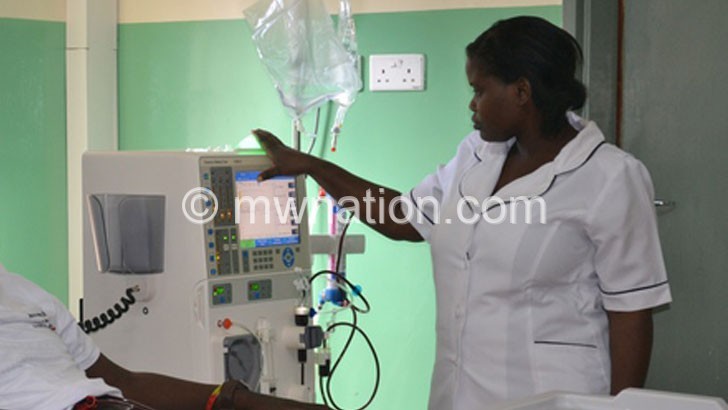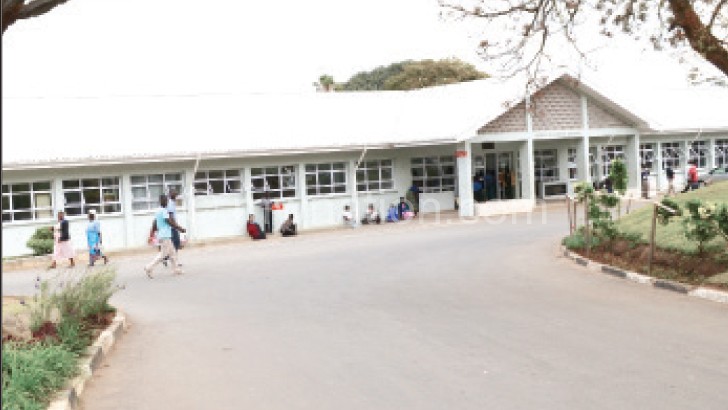A harrowing cry from Kamuzu Central Hospital
Coming through a mobile cellular phone interview from a hospital bed in Lilongwe on Monday, the desperate cries of Gertrude Banda for The Nation to “please tell government we are suffering,” was as heart-breaking as it was an indictment of the country’s crumbling healthcare system.
Banda is a 46-year-old mother of two who lives in Luchenza, Thyolo, but was speaking to us from Kamuzu Central Hospital’s (KCH) Ethel Mutharika Gynaecology Centre where she has been for the past two weeks.
Yet, she has no ailments requiring the services of a gynaecologist.

Sure, Banda has a kidney problem to be exact but she should not have been ‘admitted’ to any hospital, certainly not at KCH some 400 kilometres (km) away from her base; where she is all alone and depending on hospital food rations.
But there she is, in a gynaecology ward from where, for two weeks, she has been accessing dialysis services she should otherwise have been provided as an outpatient at Queen Elizabeth Central Hospital (QECH) in Blantyre, which is 41 km from her home in Luchenza.
But QECH had to send her to KCH because the dialysis machine at the country’s largest referral hospital is out of order. Banda has no idea how long she will be at KCH.
According to Banda, the situation at KCH was pathetic considering that the group that was sent to Lilongwe was not ‘sick’, but rather outpatients who only needed to access dialysis.
Banda who has no relative in Lilongwe and lives on hospital food, says:
“What worries me is that I might catch diseases in this hospital. As a person with kidney problems, I have low immune system.”

The case of Banda is similar to that of 14 other patients who include school-going children that QECH has packed off to KCH. They have abandoned classes in their areas of residence to ‘indefinitely’ relocate to Lilongwe to access the dialysis machine.
A total of 15 patients from Blantyre have joined about 46 others who have been accessing the Lilongwe dialysis centre, bringing the number of people using the KCH machine to 61.
The Nation has established that while female patients (including school girls) from Blantyre are admitted to Ethel Mutharika Gynaecology Centre at KCH, male patients (together with school boys) were being kept at the Central Region referral hospital’s Eye Unit.
The plight of the young people breaks Banda’s heart more as they are missing school, yet, as out-patients at QECH, they were attending school while attending dialysis sessions.
“We have school going children who, if they were in Blantyre, they could have been going to school after their sessions. Here they have been admitted. Chonde muwauze a boma tikuvutika [Please tell the government we are suffering],” she pleaded.
Out of the 15 people currently admitted to KCH from QECH, there are four girls and two boys.
The impact
Banda said with the increase of patients at KCH, the hours they are supposed to stay connected to the dialysis machine have fallen from four to less than three.
“Instead of four hours, we are staying on the machine for three hours or less. The machines are working 24 hours, including weekends. Our fear is that maybe these machines are being overworked and might breakdown too. We fear for our lives,” she said.
The Kidney Foundation in Malawi Samuel Kumwenje said there were 21 patients that have been accessing the dialysis machine at QECH and that these have either been transferred to Lilongwe or accessing the services at Mwaiwathu Private Hospital.
“Those that can afford to pay are going to Mwaiwathu. I am one of the three that are going to Mwaiwathu from those that were at QECH,” he said.
Kumwenje said the group stopped accessing QECH services in October 2015. Sometimes, he said, to reduce the cost at Mwaiwathu, they take their own reagents from QECH for use at the private facility.
“I get some reagents from QECH to Mwaiwathu at least to make the service affordable. I take some concentrator fluid, bicarbonate and artificial kidney and with medical insurance I pay about K17 000 per session.

“Those that do carry reagents, but are not on medical insurance, pay about K35 000 while those that do not take the reagents with them and are not on medical insurance pay about K60 000 per session,” he said.
A well-placed source at QECH said kidney failure was a chronic disease; hence, the hospital’s decision to transfer the patients to Lilongwe. He said the decision not to refer them to Mwaiwathu was more logistical than financial.
“People on dialysis consume a lot of resources; hence, Mwaiwathu could not have coped with the increase of 21 people. The monetary concern was not QECH’s consideration because even if bills are accumulated at Mwaiwathu, the invoice does not go to QECH, but rather central government,” he said.
QECH and KCH are the only public hospitals in Malawi with dialysis machines, according to a well-placed Ministry of Health official.
In an interview on Monday, KCH hospital director Jonathan Ngoma downplayed the challenges the hospital might have been facing with the sudden increase of patients on the dialysis machine list.
He said as a hospital they plan and that people have been accessing the machine after they have been assessed, adding that there was nothing wrong with a patient staying on the machine for less than four hours.
“We assess the patients before putting them on the machines. Based on the assessment we would know the amount of toxic materials that have to be removed in the body and anything between two to four hours is recommended depending on the patient’s condition,” he said.
He said there were some patients who are accessing the machine on daily basis, while others use it on alternate days.
Cause of QECH paralysis
QECH shut down its dialysis machines in October 2015 after two machines broke down and following government’s failure to procure bloodlines for the remaining three machines, according to a well-placed Capital Hill source and a patient who has been accessing the machines for years.
The Capital Hill source told The Nation last week that the Ministry of Health was failing to raise about K61.7 million (R1.3 million) to pay to South Africa-based supplier, Fresenius Dialysis (SA), for dialysis machine bloodlines the firm provided.
The source said this led to the company refusing to supply the reagent to Ministry of Health until government pays up.
In an earlier interview with The Nation, QECH deputy hospital administrator Chikumbutso Tambala confirmed that the hospital was unable to help patients because of non-functioning of the machines. He said some reagents run out.
The Nation established that the reagent that has run out is bloodlines. Bloodlines are tubes that connect the human body to the machines during dialysis.
Chances of government buying the reagents soon are slim as the expenditure was not planned for in the 2015/16 National Budget.
A source said a Letter of Credit that was issued to pay Fresenius Dialysis (SA) had wrong information and was rejected.
“This happened before the current budget was passed and in the current budget there was no budget line to pay the supplier. We have instructions to write Treasury to find some funding to pay the supplier. Until that happens the machine in Blantyre will not be repaired,” said the source.
MoH did not respond to a questionnaire The Nation sent on Monday. When we followed up yesterday, Health Minister Peter Kumpalume referred the matter to his principal secretary MacPhail Magwira who could not be reached. We then tried to talk to director of health services Charles Mwansambo, but he said he was in a meeting.





